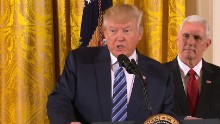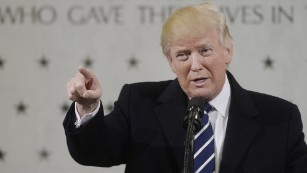Trump to begin renegotiating NAFTA with leaders of Mexico, Canada Eric Bradner
President Donald Trump said Sunday he will begin renegotiating the North American Free Trade Agreement when he meets with the leaders of Canada and Mexico.
A central promise of Trump's campaign was that he would revamp the 23-year-old trade pact.
At a White House event Sunday, Trump said he had scheduled meetings with Canadian Prime Minister Justin Trudeau and Mexican President Enrique Peña Nieto. The White House says the meeting with Nieto is set for Jan. 31.
"We're going to start some negotiations having to do with NAFTA," Trump said.
"Anybody ever hear of NAFTA?" he said. "I ran a campaign somewhat based on NAFTA. But we're going to start renegotiating on NAFTA, on immigration, on security at the border."

NAFTA explained
Convincing Canada and Mexico to renegotiate NAFTA -- or convincing Congress, where majority Republicans have long supported free trade, not to try to block him from withdrawing from the deal -- could be tough tasks.
What the Trump administration has done so far
Former President Barack Obama was critical of NAFTA as a candidate, too. His effort to renegotiate the deal came in the form of the 12-nation Trans-Pacific Partnership, which would have imposed Democratic-favored labor and environmental rules on the countries included in the deal, including Canada and Mexico.
But Trump was sharply critical of the Trans-Pacific Partnership as a candidate, saying he will kill the deal -- which is well within his power, since it has not yet been enacted.
The NAFTA teardown: Here's where Trump could start
Trump has also pledged to get Mexico to pay for a wall along the United States' southern border -- potentially, he has said, through tariffs. Imposing those border taxes now would violate NAFTA.
Any move to change the terms of NAFTA or withdraw from the deal also runs the risk of being met with retaliatory tariff hikes in other countries -- meaning the cost of goods shipped to the United States could become higher for American consumers, and US companies could lose access to key foreign markets.
News Courtesy: www.cnn.com












